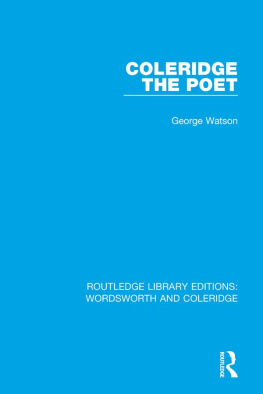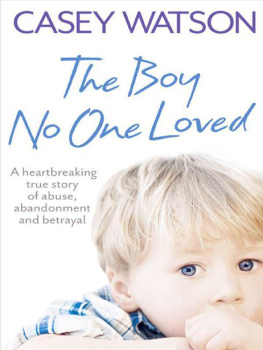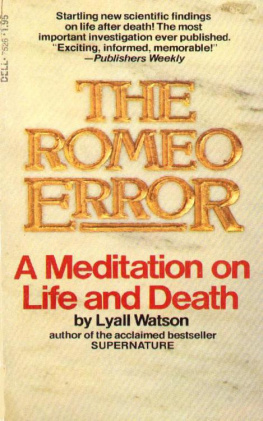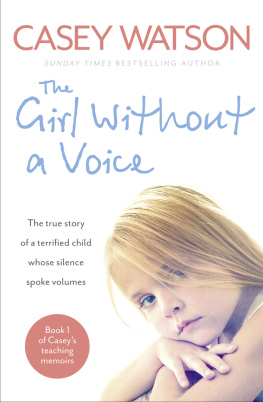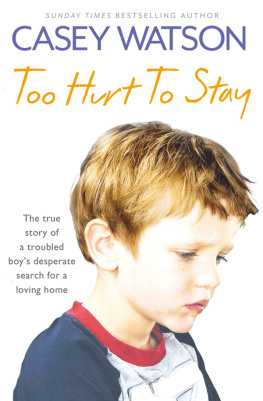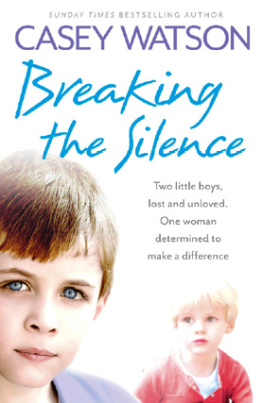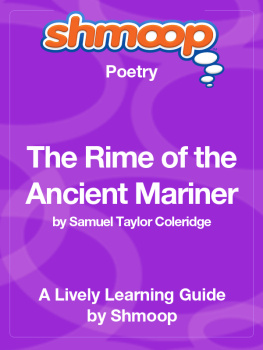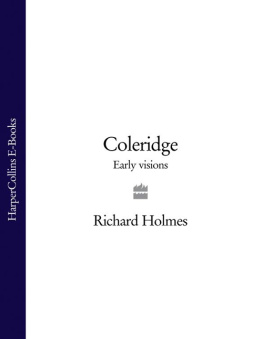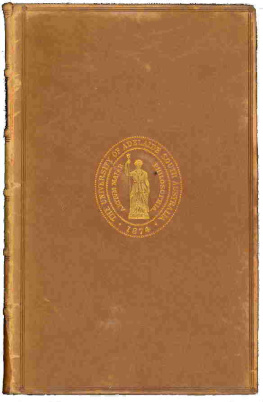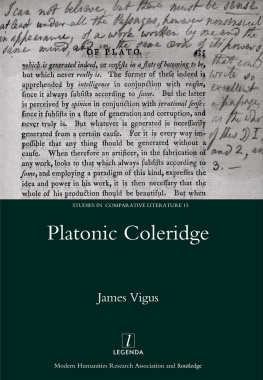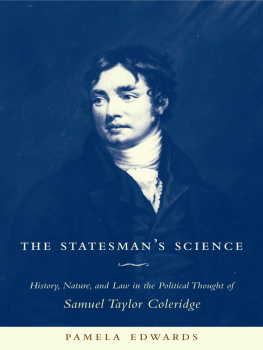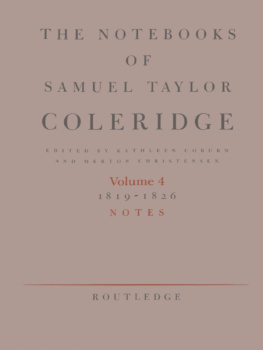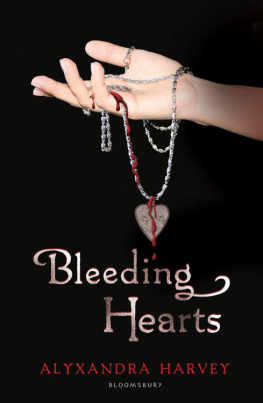Watson - Coleridge the Poet
Here you can read online Watson - Coleridge the Poet full text of the book (entire story) in english for free. Download pdf and epub, get meaning, cover and reviews about this ebook. publisher: Taylor and Francis, genre: Science. Description of the work, (preface) as well as reviews are available. Best literature library LitArk.com created for fans of good reading and offers a wide selection of genres:
Romance novel
Science fiction
Adventure
Detective
Science
History
Home and family
Prose
Art
Politics
Computer
Non-fiction
Religion
Business
Children
Humor
Choose a favorite category and find really read worthwhile books. Enjoy immersion in the world of imagination, feel the emotions of the characters or learn something new for yourself, make an fascinating discovery.
Coleridge the Poet: summary, description and annotation
We offer to read an annotation, description, summary or preface (depends on what the author of the book "Coleridge the Poet" wrote himself). If you haven't found the necessary information about the book — write in the comments, we will try to find it.
Watson: author's other books
Who wrote Coleridge the Poet? Find out the surname, the name of the author of the book and a list of all author's works by series.
Coleridge the Poet — read online for free the complete book (whole text) full work
Below is the text of the book, divided by pages. System saving the place of the last page read, allows you to conveniently read the book "Coleridge the Poet" online for free, without having to search again every time where you left off. Put a bookmark, and you can go to the page where you finished reading at any time.
Font size:
Interval:
Bookmark:

ROUTLEDGE LIBRARY EDITIONS: WORDSWORTH AND COLERIDGE
Volume 11
COLERIDGE THE POET
GEORGE WATSON

by Routledge
2 Park Square, Milton Park, Abingdon, Oxon OX14 4RN
711 Third Avenue, New York, NY 10017
A catalogue record for this book is available from the British Library
ISBN: 978-1-315-56191-2 (Set) (ebk)
ISBN: 978-1-138-67204-8 (Volume 11) (hbk)
ISBN: 978-1-138-67205-5 (Volume 11) (pbk)
ISBN: 978-1-315-61657-5 (Volume 11) (ebk)
The publisher has gone to great lengths to ensure the quality of this reprint but points out that some imperfections in the original copies may be apparent.
The publisher has made every effort to trace copyright holders and would welcome correspondence from those they have been unable to trace.
by George Watson

London
Routledge and Kegan Paul
by Routledge and Kegan Paul Ltd
Broadway House, 68-74 Carter Lane
London E.C.4
by Northumberland Press Limited
Gateshead
in any form without permission from
the publisher, except for the quotation
of brief passages in criticism
To Donal Davie
The practice of an art
is to convert all terms
into the terms of art.
This book arose naturally out of another, The Literary Critics (1962); but the connection is hardly obvious, and a word of explanation may be in order. In the earlier work, which was a history of descriptive criticism in English since Dryden, I tried to show by examples how little resemblance to the facts of literary history one common view of the interrelationship between literature and criticism bears. I mean the view that literature is about life, and that criticism is about literatureso that criticism does duty at the best as a poor relation, being about life at two removes. This view has such a commonsensical air about it, and is believed by so many who have no reason to believe in anything except because they think it true, that I might decently have hesitated even longer before opposing it openly. In fact I have chosen to work through specific cases: first, by showing that the relationship between the poetic activity and the critical in poets like Dryden, Johnson, Coleridge, Arnold and Eliot was more intimate and continuous than the common view would suggest; and now, in a more searching view of Coleridge alone, by attempting to show how little substance there has ever been in the myth of his defeat or abdication as a poetto reveal, in fact, how successful a poet he was, and how critical a poet; how partial and inaccurate the assumption, in such a case, that literature can only usefully be about life; and how critical the act of creation itself may be.
In dealing with secondary sources I have adopted a solution which is already familiar in an age of thriving literary studies, and likely to become more so: I have concentrated most of my discussion of other works in a first chapter, which is a summary review of Coleridge studies from the standpoint of one who thinks the defeatist view of his poetic achievement to have been overstated. For the rest of the book, and especially in the later chapters on individual poems, I have not usually referred to the views of others unless for some special purpose, but simply followed my own argument and given references only to direct quotations. I have silently accepted the traditional dating of Christabel, for example, and the attribution of The Mad Monk to Coleridge rather than to Wordsworth, because the contrary arguments have so far failed to convince me. To behave in this way is to risk charges of ignorance, or plagiarism, or both. I should find ignorance an accusation hard enough to rebut, and remain deeply conscious of how much in romantic studies, in spite of my best efforts, I may have missed. Plagiarism would be a graver matter; at all events, I am conscious of many debts. James Dykes Campbells edition of the Poetical Works (1893) contains what is still the best commentary to the poems. The books and articles of Humphry House, Kathleen Coburn, J. B. Beer and George Whalley have taught me much, and their friendship more; and the Bollingen Foundation has earned the gratitude of every scholar in the field by sponsoring the first complete edition of the notebooks. The encouragement of Cambridge colleagues, notably Miss Barbara Everett, Professor Graham Hough, Mr A. G. Lee and Dr David Frost, has been indispensable to me. And my debt to the editors of the following works will be evident on every page.
| BL | Biographia Liter aria, London (1817) with chapter-numbers; |
| CL | Collected Letters, edited by E. L. Griggs, 6 vols. Oxford (1956-) (in progress); |
| CN | Notebooks, edited by Kathleen Coburn, 11 vols. New York (1957-) (in progress), with the number of the note; |
| CPW | Complete Poetical Works, edited by E. H. Coleridge, 2 vols. Oxford (1912)for the poems themselves, the page references being largely the same for his one-volume edition of The Poems in the Oxford Standard Authors series, Oxford (1912). |
The first complete editions of the notebooks (CN) and letters (CL) of Coleridge have transformed the subject in recent years, both by furnishing more accurate texts of existing material and by adding much that is new. The editors have naturally chosen to reproduce Coleridges own vagaries of spelling and punctuation. Now that these texts are on record, however, there seems no good reason for reproducing elsewhere such oddities as are in place in an authors private notes but out of place in a more formal study. My object has been to make sense of Coleridge, and regularizing his text is one way of doing it. For this reason I have modernized his spelling and punctuation, expanded his contractions, ignored his deletions and left his interpolations unspecified. The puzzling details of these texts are now there for anyone to consult, but this has not seemed a proper place in which to record them.
St Johns College,
Cambridge September 1965
Font size:
Interval:
Bookmark:
Similar books «Coleridge the Poet»
Look at similar books to Coleridge the Poet. We have selected literature similar in name and meaning in the hope of providing readers with more options to find new, interesting, not yet read works.
Discussion, reviews of the book Coleridge the Poet and just readers' own opinions. Leave your comments, write what you think about the work, its meaning or the main characters. Specify what exactly you liked and what you didn't like, and why you think so.

